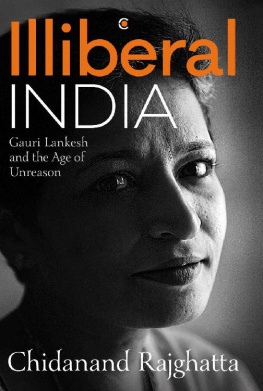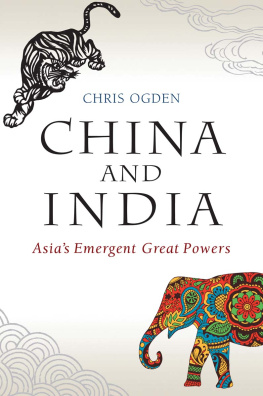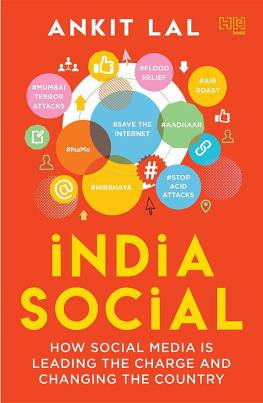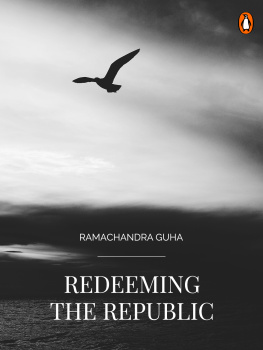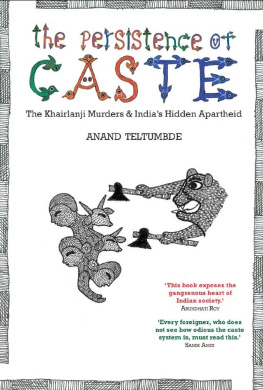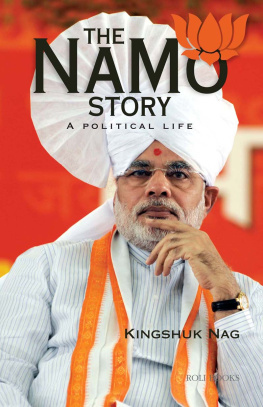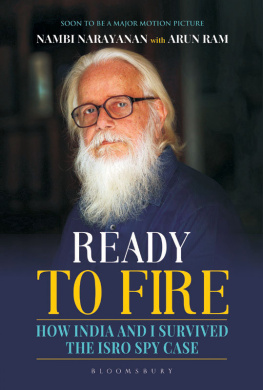


First published by Context, an imprint of Westland Publications Private Limited
61, 2nd Floor, Silverline Building, Alapakkam Main Road, Maduravoyal, Chennai 600095
Westland, the Westland logo, Context and the Context logo are the trademarks of Westland Publications Private Limited, or its affiliates.
Copyright Chidanand Rajghatta , 2018
ISBN: 9789387894020
The views and opinions expressed in this work are the authors own and the facts are as reported by him, and the publisher is in no way liable for the same.
All rights reserved
Typeset Adoe Devanagari by Jojy Philip, New Delhi
No part of this book may be reproduced, or stored in a retrieval system, or transmitted in any form or by any means, electronic, mechanical, photocopying, recording, or otherwise, without express written permission of the publisher.
CONTENTS
I T WAS TEN IN THE morning on 5 September 2017 at our home in Takoma Park, just outside Washington DC, and I was mutely staring at my cellphone. Mary was on the line from Bangalore, now called Bengaluru. Gauri has been shot dead... at least thats what they are reporting on TV... she sobbed.
My wife, telling me about the assassination of my ex-wife.
Another journalist friend had called me from Delhi moments before to convey the first sketchy report to me with the breathlessness reporters save for breaking news. Marys tearful call confirmed the news.
My mind was a whirl. Gauri... gone. Just like that. Shot. Who? Why? How utterly meaningless. Only famous people get shot. Was she famous? Not for me. She was my former wife, and more importantly, a peerless, priceless friend.
I walked around in a daze, and then stepped out for a breath of fresh air in our sylvan suburb, where I had lived for the past seventeen years, the last eight with Mary and our two children. Gauri and I had been divorced for more than twenty-five years and separated for nearly thirty. But we remained immense friends. Mary had become friends with her too and the kids adored her; she was family. Yes, I know its unusual. But that is who we all are; that was Gauri.
Returning home after a long bracing walk down Sligo Creek, I dug out a photo box from the attic and found a couple of old photos from the 80sincluding a black-and-white print of her that I had taken on the rooftop of her dads home in 1983, just before we got married at a very young age. Then, I scrolled through the emails we had exchanged until very recently as I looked for tickets on Kayak to fly back to India immediately. In between, I began writing a personal tribute to a woman with whom courtship lasted five years, marriage five years and a friendship till her dying day. In the sixteen hours to Delhi, that tribute (see Postscript) to an extraordinary woman, under the headline Amazing Grace, would go viral across the world.
On the long flight home, I replayed the years of a beautiful friendship in which marriage was just a small part. The idea that someone would assassinate this slender, small-built and utterly vulnerable woman, feisty though she was, was beyond comprehension, and beyond cowardly. Gauri had taken on some radical causes in recent years, including rehabilitation of Naxals, and fighting for Dalit and minority rights and representation. But none of that seemed to be or was deserving of putting her life in the crosshairs. Although I was aware of the murders of like-minded intellectuals, Narendra Dabholkar, Govind Pansare and M.M. Kalburgi, she was associated only with the last. Besides, it seemed beyond imagination that anyone would target a woman.
Gauri Lankesh was disputatious to a fault. I should know. We argued relentlessly, mostly good-naturedly, in our exuberant youth when India was so full of promise and problems, as it still is. But she was also a large-hearted and fair-minded woman, a trait that extended our friendship beyond marriage. Small-built women have big hearts, she would joke about her slender but supple physique honed by yoga in her youth and dissipated later. Her clinching argument when she shanghaied me into bankrolling some good cause was to remind me that I owed it to her in lieu of alimony!
We had divorced in 1990 in circumstances that could best be described as youthful carelessness, perhaps immaturity. If she was a woman of such amazing grace, why would you divorce her, someone from the troll patrol on Twitter, home to many twisted minds, asked after her death, justifiably mystified by our unusual friendship. All I can say in our defence was that we were young and foolish. But what we lacked in maturity, we made up with grace, and with age, calmness and mutual respect. Of course, we still argued. However, her combativeness was based for the most part on higher ideals, on wanting a fair deal for the underdog. In recent years, she lived for the underdog.
After the pathology of our break-up and divorce wore off, we jousted frequently over issues political, ideological and religious. Although we came from similar backgrounds (middle-class Lingayat families, though we were neither religious nor believers), she was leftist, radical and intense. I considered myself a moderatecentrist, and most of all, karmic more than dharmic. Some four years after our divorce, I left for the United States after another relationship train wreck, hoping to restore my spirits and professional nous in what was to be a two-year sabbatical. Instead, it has lasted twenty-five years.
In that time, our post-divorce friendship swung often from fiercely antagonistic to frosty to familial (almost like siblings, someone said). Some of our more recent exchanges took place through Facebook video chats. Occasionally, she would call late at night to give me updates and low-downs on her horaata (struggle, agitation) in politics, life, etc. Joy, despair, fury and celebration coursed through her. She was always quick to anger, but the growing apathy of the elites and the expanding inequity in Indian society infuriated her to a degree that those of us who had inured ourselves to it through indifference, distance or flight could not appreciatepresent company included.
In fact, for several years, I had ignored her friend request on Facebook, telling her bluntly that I feared her quicksilver temper and sulphurous tongue (and acerbic pen/keyboard). I had been smarting for a long time from her putdowns of Non-Resident Indians (NRIs), a tribe she looked down upon because she felt they had abandoned India. But I felt I was not honouring her love for Diya and Dhyan and affection for Mary because I posted frequent updates about them for the family, and only she was left out of the loop. We had always regarded her as family, as she did with us.
So, in May 2017, I finally hit the accept button after a long, friendly chat. Nice talking and to be finally connected on FB. But please! NO SNIDE/NASTY comments and no political scraps! I wrote. She replied, No. Promise. There was a full stop between No and Promise, I noted, meaning she was promising she would not be the fiery agitator she often was, even with me. To another person or at another time not so long ago, this doughty fighter might have said, No promises.
By the time I returned to Bangalore to attend a memorial meeting for Gauri at the Central College grounds; several friends, including some in the publishing industry who knew both Gauri and me, were urging me to write on the woman I knew. But how well did I know her? After all, we had been separated for a long time, and she had grown and evolved in her political beliefs, as had I. Although we had remained in touch and spoke often (or at least more frequently than divorced couples do), I did not have a complete awareness of her recent life. I was full of self-doubt, particularly after seeing the outpouring of emotion after her death.
Next page
